Related Research Articles

Caenorhabditis elegans is a free-living transparent nematode about 1 mm in length that lives in temperate soil environments. It is the type species of its genus. The name is a blend of the Greek caeno- (recent), rhabditis (rod-like) and Latin elegans (elegant). In 1900, Maupas initially named it Rhabditides elegans. Osche placed it in the subgenus Caenorhabditis in 1952, and in 1955, Dougherty raised Caenorhabditis to the status of genus.

Crassostrea is a genus of true oysters containing some of the most important oysters used for food. Some species in the genus have been moved to the genus Magallana.
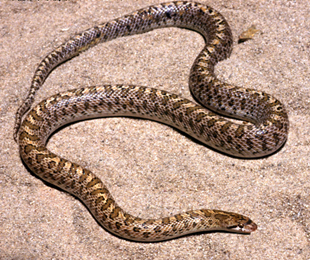
Arizona elegans is a species of medium-sized colubrid snake commonly referred to as the glossy snake or the faded snake, which is endemic to the southwestern United States and Mexico. It has several subspecies. Some have recommended that A. elegans occidentalis be granted full species status.
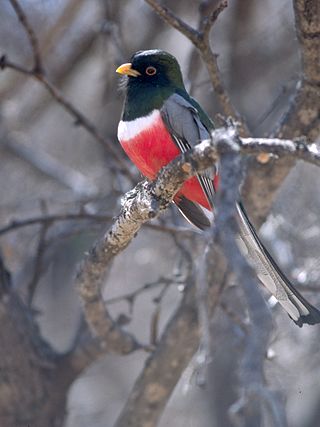
The elegant trogon, also known as the coppery-tailed trogon, is a near passerine bird in the trogon family.

Elmisaurus is an extinct genus of caenagnathid dinosaur from the Late Cretaceous Nemegt Formation of Mongolia. It was a theropod belonging to the Oviraptorosauria.

The ring-tailed vontsira, locally still known as the ring-tailed mongoose is a euplerid in the subfamily Galidiinae, a carnivoran native to Madagascar. It is the only species in the genus Galidia.
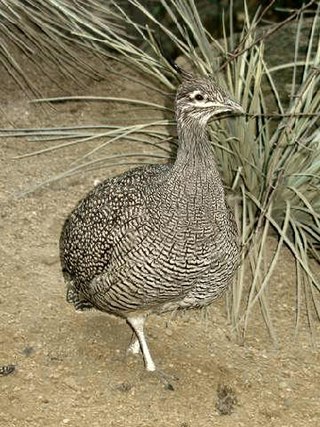
The elegant crested tinamou or martineta tinamou is a medium-sized tinamou that can be found in southern Chile and Argentina in Shrubland. The bird has an omnivorous diet. This species is terrestrial due to their poor flying ability.

Caenorhabditis is a genus of nematodes which live in bacteria-rich environments like compost piles, decaying dead animals and rotting fruit. The name comes from Greek: caeno- ; rhabditis = rod-like. In 1900, Maupas initially named the species Rhabditis elegans, Osche placed it in the subgenus Caenorhabditis in 1952, and in 1955, Dougherty raised Caenorhabditis to the status of genus.
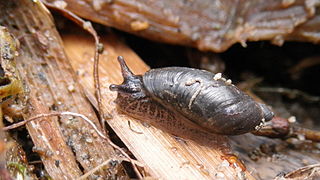
Oxyloma elegans is a species of small European land snail, a terrestrial pulmonate gastropod mollusk belonging to the family Succineidae, the amber snails.

The Wyoming ground squirrel is a species of rodent in the family Sciuridae. It is endemic to the Northwestern United States.

The elegant water shrew is a species of mammal in the subfamily Soricinae of the family Soricidae. It is the only species within the genus Nectogale. It lives in Sikkim and China.

Chonetes is an extinct genus of brachiopods. It ranged from the Late Ordovician to the Middle Jurassic.
Micropterix elegans is a species of moth belonging to the family Micropterigidae that was described by Stainton in 1867, and is endemic to Israel.
Camarotoechia is an extinct genus of brachiopods found in Paleozoic strata.
Chaetonotus elegans is a species of gastrotrichs in the genus Chaetonotus. It is found in freshwater of Europe.

Apophysomyces variabilis is an emerging fungal pathogen that can cause serious and sometimes fatal infection in humans. This fungus is a soil-dwelling saprobe with tropical to subtropical distribution. It is a zygomycete that causes mucormycosis, an infection in humans brought about by fungi in the order Mucorales. Infectious cases have been reported globally in locations including the Americas, Southeast Asia, India, and Australia. Apophysomyces variabilis infections are not transmissible from person to person.
Caprellinoides is a genus of amphipods in the family Caprellidae.
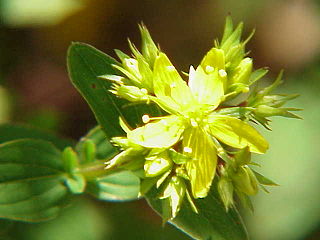
Hypericum elegans is a species of flowering plant in the St. John's wort family Ericaceae. It is native to Europe.
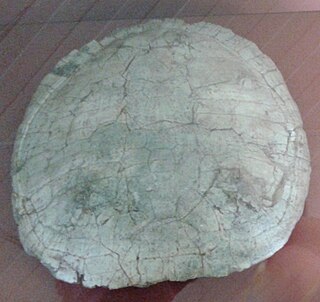
Bauruemys is an extinct genus of turtles in the family Podocnemididae.
Semotivirus is the only genus of viruses in the family Belpaoviridae. Species exist as retrotransposons in a eukaryotic host's genome. BEL/pao transposons are only found in animals.
References
- Notes
- ↑ Amphipoda. KH Barnard - 1932
- Sources
- Biodiversity of the Weddell Sea: macrozoobenthic species (demersal fish included) sampled during the expedition ANT Xllll3 (EASIZ I) with RV "Polarstern". Julian Gutt, Boris I. Sirenko, Wolf E. Arntz, Igor S. Smirnov and Claude De Broyer, Ber. Polarforsch. 372 (2000) ISSN 0176-5027